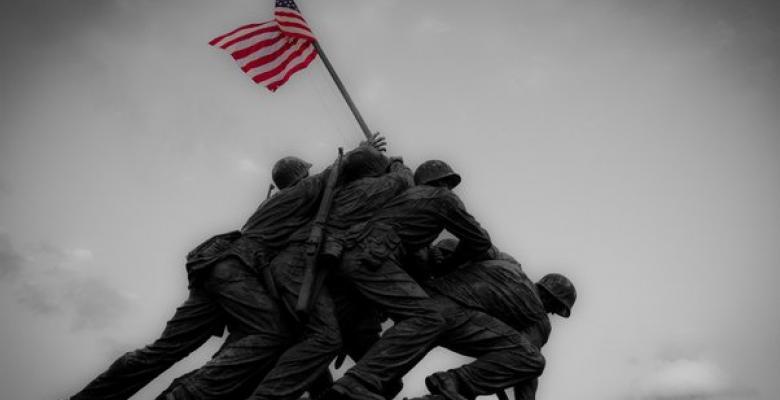The Peel and the Grain: The United States and the Imperialist War in the 21 Century

Throughout history, the United States has been a decisive leading actor in the international system and, in an outstanding way, in war events and the articulation of belligerent situations that have endangered, and still do, world peace. If we think about the matter in the light of the current century and based on the logical relationship between possibility and reality established by dialectical philosophy, it's clear that a better world is possible. But in the meantime, a worse world is real. The conflict unleashed between Ukraine and Russia, as well as between Israel and the Palestinian cause, in which North American geopolitical interests operate in disguise, as well as the economic war and subversive actions of all kinds that they openly promote against Cuba and Venezuela, are graphic testimonies of the aforementioned prominence and the centrality of that action. It causes one of the main global problems that plague humanity, along with underdevelopment, crises and environmental predation. Perhaps it's worth reflecting on this. Appearance and reality, the shell and the grain, are often confused. What is happening concerns the imperialist nature of the system that supports North American domination.
After the formation of the United States as a nation, in the midst of the process of capitalist consolidation and expansion, and until today, the impact of its foreign policy and the influence of the accompanying symbology, embodied in values, traditions and ideological constructions, have conditioned and even determined the course of many world affairs.
This has led – using the familiar distinctions of the well-known American intellectual, ideologue and political scientist, Joseph Nye – both the application of hard and soft power methods, along with the occasional combination of both, through smart power. Three names that designate subversive modalities, which complement each other, oriented
towards regime change in countries whose governments are considered adversaries of imperialism or obstacles to its world domination.
Beyond such concepts and practices, which were novel at the time and which maintain their presence in strategic and academic language, the truth is that the United States has never renounced war, in its most universal sense. That is, understood, following the classic definition of Clausewitz, a famous Prussian soldier, which Lenin made his own, as a
continuation of politics by violent means. This is the type of war that North American imperialism carried out, for example, against Korea in the 1950s, against Vietnam in the 1960s, and the one that materialized in the military invasions, just over twenty years ago, in Afghanistan in 2002 and Iraq, in 2003. It is the variant of war that it promotes, from
the shadows, without involving its troops, in which Ukraine stars against Russia, and Israel against Palestinian territories, in both cases avoiding its image being compromised. and responsibility as a historical and political person. It is the type of war that knows no geographical, legal or moral limits, that violates elementary human rights, that resorts to ethnocide and genocide.
The structuring of the various international orders, the readjustments and courses of world politics between agreements, alliances, confrontations, conflicts, war episodes, negotiations and treaties, since the 19th century and with greater accents in the course of the 20th, are examples of the growing and fundamental role of the United States, whose renewed performance extends during the first decades of the 21st century. The effects of the so-called “end” of the Cold War and the terrorist attacks in 2001 on the Twin Towers in New York and The Pentagon facilities of the Department of Defense in Washington, frame an era of historical transition, described in different ways. In it we see a world of political unipolarity, economic multipolarization, predominance of the American model on a universal scale, configuration of global capitalism. The United States is in decline, with economic problems and various crises, but still thriving, with strengths in military, cultural and media power, with economic difficulties, in geopolitical dispute with other powers, such as China and Russia. An international system still marked by globalization and neoliberalism stands out, between contradictions and rearrangements, in which intolerance gains space along with various manifestations of reactionary extremism, radical right and fascism, usually accompanied by discrimination and hatred, Siamese brothers of contemporary war.
In this context, United States foreign policy today continues to promote instability by promoting hybrid forms of non-conventional warfare without abandoning the old formats, using warlike actions, in line with the imperialist condition of the system that generates and sustains variants of institutionalized brutal violence. Although it has been adapting to the changing scenarios of world dynamics, promoting its permanent interests of domination and circumstantial purposes, this policy reproduces its founding bases, which make up the ideology of the nation and cultural identity, the implementation of which does not corresponds, as is known, to that idealist imaginary, which seeks to enshrine values such as democracy and freedom as universal, in the North American style. The divorce between sayings and facts, between the discourse that enunciates politics and its actual course, between rhetoric and truth, is an indelible trace that characterizes the work of the United States, inside and outside its borders.
Perhaps the most graphic example that comes to mind is the war in Ukraine. Especially given the difficulty of finding truth in today's world, in which fake news, misrepresentations, and biased information abound, manipulated by digital social networks, traditional media and political addresses, all of which feed the popular imaginary and
public opinion.
The most common presentation of the problem is that the armed conflict taking place in the heart of Eastern Europe is a war between Russia and Ukraine. It’s defined as a product of Russia's invasion of Ukraine, associated with the imperial ambitions of the first of these countries (Putin's) and nostalgia for the old empire of tsars and the USSR. Thus, by militarily and financially supporting the Ukrainian government, the United States, with the backing of NATO, act as representatives of the “free world” and justice in the current “world order.” This isn’t the case. Another fairly widespread perspective is the one that considers this conflict as a war between the forces of socialism and capitalism or between the right and the left at the international level. That is, as an expression of the contradictions between the “socialist camp” and the “imperialist camp.” That's not the case either.
If we look closely at the history of North American foreign policy and the logic that has characterized it, this war is revealed to be an imperialist war, involving the United States, which appeals, as on so many previous occasions, to NATO, directed against Russia, on Ukrainian soil, protected by geopolitical conceptions and aspirations. Ultimately, it’s an expression of the contradictions between great powers, which shatters illusions that such counterpoints can be reconciled or overcome by settling diplomatic agreements. Russia is
not a power with an imperialist connotation, in the opinion of the author of this writing, but it’s a great power, and it has a calling for global presence and power. Looking at its history, culture and importance for universal progress, it’s clearly explainable. Her role in the defeat of fascism and the conquest of cosmos would be enough to illustrate the above, beyond the sympathy or rejection that its leaders or representatives have stirred since the times of former Soviet Union.
It’s useful to discern between the peel and the grain in the analysis, especially when it comes to political processes and wars with global implications. War has shown in the past its ugly potential, to persist, to extend, to confuse, to coexist, within peace, to be intertwined with it. That’s the trend that has been going on for some time, reaffirmed at the beginning of this century, when the United States declared the so-called Global War on Terrorism, after the aforementioned terrorist attacks in 2001.
In a nutshell, it’s that the imperialist war is not only reduced to the periods in which armed confrontations take place, in the style of those who have been called world wars (the First, the Second), of devastating magnitude, material, physical, cultural, of permanent destruction of natural resources, buildings, ecological environments, mass exterminations and dangers of extinction of species, including humans, in the first place. From this point of view, one can reflect on this matter, affirming, with realism and pain, that war is no longer war, in the sense in which the term has usually been used. And that peace, in a similar sense, is not peace either, in terms of durability. As long as imperialism exists and its repercussions transcend it, once it’s transformed or disappears, it’s difficult to imagine that we can speak, in an absolute way, about the end of war and an era of lasting peace, which is here to stay. Imperialism is not an eternal phenomenon, of course. But his departure from the historic scene won’t be spontaneous, it will have to be pushed, to that end. Peace is possible, but we must fight for it, to achieve it, keep it, reproduce it, to turn the possibility of a better world into reality.
Translated by Amilkal Labañino / CubaSí Translation Staff













Add new comment